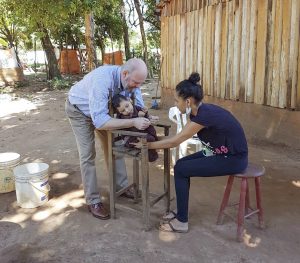
TUSCALOOSA, Ala. – The University of Alabama College of Education has launched the Evidence-based International Early Intervention Office to promote an intervention model designed for children younger than 6 with disabilities and their families.
The Routines-Based Model of Early Intervention focuses on building the strengths of the child’s natural caregivers, a departure from models in which professionals work directly with children in a clinic, office or classroom. The model is used in the United States and in such countries as Australia, Canada, New Zealand and Taiwan.
The Routines-Based Model “turns the traditional method upside down,” said Dr. Robin McWilliam, developer of the Routines-Based Model and director of the office.
“Some of these highly specialized interventions take place once a week, and children under the age of 6, especially those with disabilities, do not learn in a single hour,” McWilliam said. “So, our value and model is about building the capacity of the caregivers — parents, child-care providers, or anyone who spends hours with the child and looks after him or her — throughout the days in their regular routines to help deliver the intervention.”
The EIEIO will conduct a pair of early intervention studies in Alabama this semester, including one with the early intervention program at Community Service Programs of West Alabama. The Tuscaloosa study will focus on coaching and observation of home visitor practices and implementation of the model by parents. The feedback may help reshape these practices, McWilliam said.
McWilliam said problem behavior in children has increased dramatically in the last 15 years, and he believes the EIEIO’s model, which focuses on engagement and social relationships among children, can help stem problem behavior and improve academic success.
“If a child has difficulties because of disabilities, or because the environment is bad, the child isn’t as engaged,” he said. “When kids are engaged, by definition it’s appropriate behavior. When they are engaged for a long time, that means their attention spans are good and at more sophisticated levels. Engagement is a good predictor of future academic success.”
The EIEIO will receive assistance from a post-doctoral student and graduate students. McWilliam expects to add another faculty member to the office. Later, the EIEIO will explore embedding the model in all Early Childhood Special Education courses, because the model covers issues of assessment, intervention and working with families.
The EIEIO also will create a network of “UA affiliates” from colleges and schools across campus, such as the College of Human Environmental Sciences, department of psychology and the School of Social Work, to aid in research.
The EIEIO is an outgrowth of The RAM Group, a collection of early intervention experts from around the world who exchange information and provide technical assistance on the Routines-Based Model. The UA office gathers the efforts of researchers and trainers to conduct research and provide technical assistance to programs, states and national programs.
Contact
David Miller, UA Strategic Communications, 205/348-0825, david.c.miller@ua.edu
Source
Dr. Robin McWilliam, director, Evidenced-based Early Intervention Office, 205-348-6527, ramcwilliam@ua.edu
